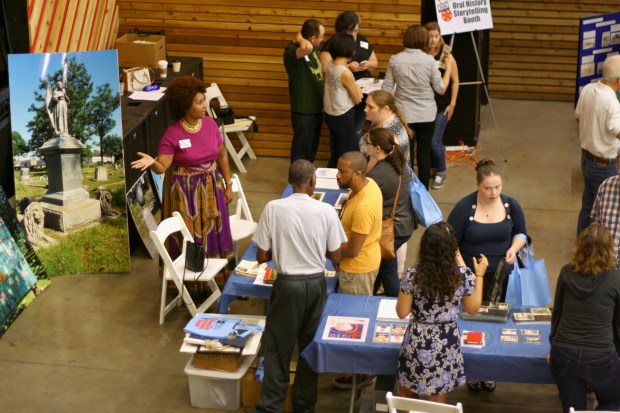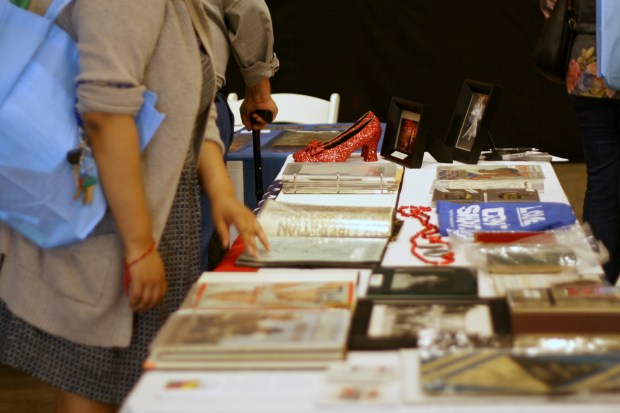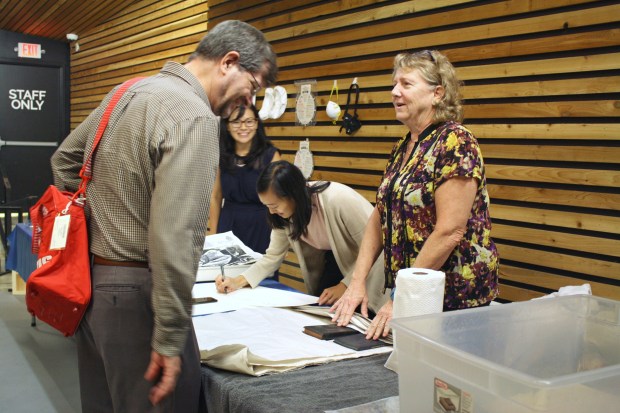
This post was authored by guest contributor Vince Lee, Archivist at the University of Houston, and current member of SAA’s Committee on Public Awareness (COPA).
The National Women’s Conference: Taking 1977 into the 21st Century, November 6-7, 2017
Although the conference marking the 40th Anniversary of the historic 1977 National Women’s Conference has come and gone, many of its memories, the impact of the sessions, and the camaraderie and interactions of the attendees, who for some was a reunion of sorts, are something all will take back with them from their two days at the University of Houston. The event marked a collaborative partnership between UH’s Center for Public History, the Department of Women’s, Gender & Sexuality Studies, UH Libraries and Special Collections, Houston Public Media, and other partners and donors across campus. Many of the volunteers present over the past two days at registration and the information tables were UH students, staff, and faculty who generously volunteered their time to answer questions, provide direction, record oral histories, and troubleshoot problems to ensure a successful conference experience for attendees.

Conference signage. Photo courtesy of Vince Lee.

Conference registration table. Photo courtesy of Vince Lee.
Oral History Commons
One of the highlights of the two-day conference was the oral history commons that was setup in Special Collections. Interested participants could drop in or schedule in advance a short ten-minute StoryCorp style interview recorded by a team of graduate students from the Center for Public History. Interviewees were encouraged to talk about their experiences of the 1977 National Women’s Conference. As a result we were able to capture conversations from attendees and original delegates that were there at the 1977 conference. Once all the footage is compiled we will provide access to the oral histories on the UH Digital Library site.

Oral History Commons at the conference. Photo courtesy of Vince Lee.
Student-Curated Exhibit
The conference provided a venue and an opportunity to unveil the opening of the student-curated exhibit for the 1977 National Women’s Conference, entitled Spirit of Houston: A Retrospective 40 Years in the Making. As part of a class project this past spring, students from the course, Issues in Feminist Research selected materials from the Marjorie Randal National Women’s Conference Collection. Materials selected would relate to the five themes each student group were working on for each of the five exhibit cases, namely: Origins, Preparing for the Conference, 4 Days at the Conference, Controversies and Challenges, and Impact of the National Women’s Conference. Students were recognized for their contributions to the exhibit at a reception given by the library on the final day of the event. As an added bonus, I was able to have my picture taken in front of the exhibit with Peggy Kokernot Kaplan, one of the original runners and torch bearers to the 1977 National Women’s Conference.

Students with their professor in front of the student-curated exhibit. Photo courtesy of Regina Vitolo.

Peggy Kokernot Kaplan with Vince Lee in front of the exhibit. Photo courtesy of Vince Lee.
Collaboration and Partnership
In collaboration and partnership with the Texas Archive of the Moving Image (TAMI), TAMI and UH Special Collections offered a free film and video digitization program to attendees who brought in footage they had on the 1977 National Women’s Conference. Formats that we could accept included VHS, Betamax, Umatics, and mini DV tapes as well as 8 or 16 mm film. Owners of the footage would complete a loan/use agreement form with the deposit of the media. In exchange TAMI and UH Libraries would inventory the film and videotape, provide minor cleaning and repairs if necessary, and digitize the materials. Originals would then be returned to the owners, along with the digitized files- transferred to an external hard drive provided by the owner or, for smaller collections, onto DVDs or a 2GB thumb drive provided by UH Libraries.

Texas Archive of the Moving Image station at the Conference. Photo courtesy of Vince Lee.
Wikipedia Edit-a-Thon and Tours
A full day (9-5) Wikipedia edit-a-thon was offered where interested participants could drop into one of the computer classrooms, learn how to contribute entries to Wikipedia, and start working on entries to help raise awareness and representation of women and feminist topics through the addition of their articles and entries. Other attendees took advantage of tours offered of the Carey Shuart Women’s Archive and Research Collection to learn more about the collections that are housed there in addition to a tour of the exhibit given by student curators.

Student-curated exhibit.
Photo courtesy of Regina Vitolo.
Sissy and Sarah
Throughout the two-day conference there were panels and sessions offered on a wide range of topics touching on “Feminism and Conservatism”, “Mixed Outcomes of the 77 Conference”, to “Art, Activism, and Artists” and “Invisible Minority Women”. The culmination of the conference was a Roundtable Discussion given by Frances “Sissy” Farenthold and Sarah Weddington and moderated by Dr. Nancy Young. Their discussion for the evening would focus on the topic of Women, Politics, and the Law. They provided their recollections of the 1977 conference and what they have learned, the political ramifications both in front of and behind the scenes, and taking stock of the current political climate for women and where we go from here with the next generation of women.

L-R: Sarah Weddington, Dr. Nancy Young (moderator), and Sissy Farenthold at the UH Law Center Roundtable Discussion on Women, Politics, and Law. Photo courtesy of Vince Lee.
The two-day conference was a partnership and demonstration of collaboration among the different departments across the UH Campus in raising awareness of what we each could contribute to an historic and singular event. The conference itself was available and open to the general public. For more information on the conference and the various partners involved please visit: http://www.uh.edu/class/mcgovern/national-women-conference/index
To listen to the exhibit podcast: https://soundcloud.com/user-839796282


 In this post, ArchivesAWARE! chats with Emily Vinson, President of Archivists of the Houston Area (AHA!) and Audiovisual Archivist at the University of Houston Libraries Special Collections, about the recent
In this post, ArchivesAWARE! chats with Emily Vinson, President of Archivists of the Houston Area (AHA!) and Audiovisual Archivist at the University of Houston Libraries Special Collections, about the recent 




 Emily Vinson is Audiovisual Archivist and curator of the KUHT Collection at the University of Houston Libraries Special Collections. Prior to UH, Emily worked as an archivist at Rice University’s Baker Institute for Public Policy; a project archivist preserving unique audio holdings at New York Public Radio; and a fellow in Preservation Administration at New York Public Library. She holds an MS in Information Studies with a Certificate of Advanced Studies in Preservation Administration from the University of Texas, Austin. Emily currently serves as the President of the Houston Area (AHA!), and is co-chair of the Preservation Committee for the Association of Moving Image Archivists (AMIA).
Emily Vinson is Audiovisual Archivist and curator of the KUHT Collection at the University of Houston Libraries Special Collections. Prior to UH, Emily worked as an archivist at Rice University’s Baker Institute for Public Policy; a project archivist preserving unique audio holdings at New York Public Radio; and a fellow in Preservation Administration at New York Public Library. She holds an MS in Information Studies with a Certificate of Advanced Studies in Preservation Administration from the University of Texas, Austin. Emily currently serves as the President of the Houston Area (AHA!), and is co-chair of the Preservation Committee for the Association of Moving Image Archivists (AMIA).